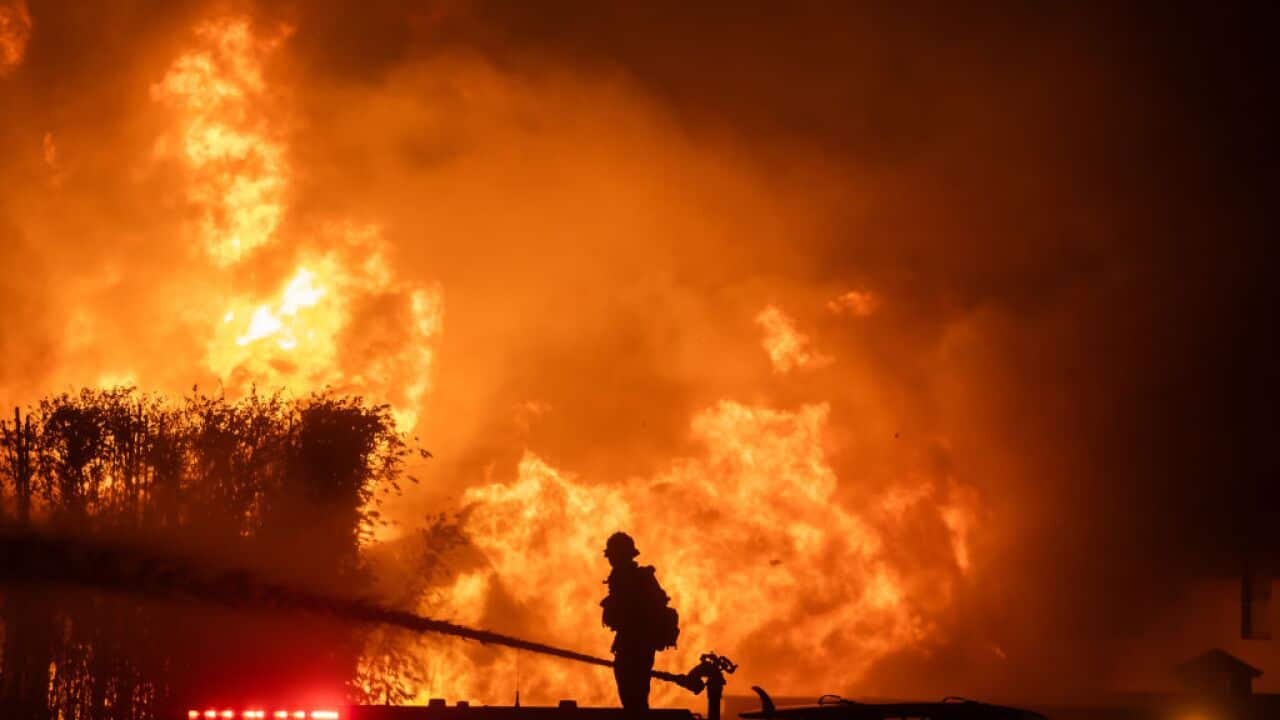Hundreds of incarcerated firefighters are among those battling major wildfires that continue to cause devastation across parts of Los Angeles.
While a brief respite from fierce winds that have fanned the flames has allowed crews to slow their spread, were burning uncontained on Friday (Thursday afternoon local time).
At least five people have been killed, thousands of structures destroyed and nearly 180,000 people ordered to evacuate their homes, officials said.
California’s Department of Corrections and Rehabilitation (CDCR) said in a statement to the Guardian that it had deployed 395 imprisoned firefighters across 29 crews, which are embedded with the state’s Department of Forestry and Fire Protection (Cal Fire).
In a statement on Wednesday, California Governor Gavin Newsom said more than 4,700 firefighting personnel had been deployed, including local and federal partners.
California has used volunteer inmate firefighters to provide extra support in battling blazes, among other disasters, for many years.
But more broadly, civil rights organisations and justice advocates have long decried the “exploitation” of incarcerated workers in the United States, saying they are under the complete control of their employers, stripped of minimal protection and typically earn little pay.
California’s ‘fire camps’
The CDCR, in co-operation with Cal Fire and the LA Country Fire Department, runs 35 conservation camps — what are commonly known as fire camps — in 25 counties across California. Two of these are for incarcerated women.
This program started in 1915.
Inmates involved support state, local and federal government agencies in their response to emergencies — from fires and floods to other disasters.
“Wildfires are a constant and formidable challenge for California, and CDCR conservation fire camps remain dedicated to supporting the state’s response,” Jeff Macomber, CDCR secretary, said in the statement on Wednesday.
“The work of our incarcerated firefighters and staff is an essential part of this effort, and their commitment to protecting lives and property during these emergencies cannot be overstated.”
Incarcerated firefighters must volunteer and meet all eligibility criteria to protect public safety, the CDCR says. No-one is involuntarily assigned to work in a fire camp — and they do not face disciplinary action if they choose not to partake.
They are trained to use hand tools to help suppress wildfires; they don’t use water or hoses.
Depending on their skill level, incarcerated fire crew members earn between $9.37 (US$5.80) and $16.54 (US$10.24) per day, according to the CDCR.
They earn an extra $1.60 (US $1) per hour while assigned to an active emergency, during which they can work 24-hour shifts, followed by 24 hours of rest.
According to a 2018 Time Magazine report, incarcerated firefighters were four times more likely to sustain injuries compared with professional firefighters working on the same fires.
Incarcerated workers ‘typically earn little to no pay at all’
The US incarcerates over 1.2 million people in state and federal prisons, and two-thirds of these inmates are also workers, according to a 2022 report from the American Civil Liberties Union and the University of Chicago’s Global Human Rights Clinic.
“In most instances, the jobs these people in prison have look similar to those of millions of people working on the outside,” the report says.
“But there are two crucial differences: Incarcerated workers are under the complete control of their employers, and they have been stripped of even the most minimal protections against labor exploitation and abuse.”
The 13th Amendment to the US Constitution, which protects against slavery and involuntary servitude, “explicitly excludes from its reach those held in confinement due to a criminal conviction”.
The report claims more than 76 per cent of incarcerated workers report being required to work or face additional punishment, something that would be illegal if imposed on those not incarcerated
US law also explicitly excludes incarcerated workers from universally recognised workplace protections, the report says, meaning incarcerated workers are not covered by minimum wage laws or overtime protection.
“Nobody expects prison labour to be highly remunerative. But incarcerated workers typically earn little to no pay at all,” the report says.
“It is rare that a job pays more than a dollar an hour—even the incarcerated firefighters braving the flames that rage across California’s forests and hillsides year after year are compensated at $1 an hour.
“Even so, many consider themselves lucky to receive these low wages.”
